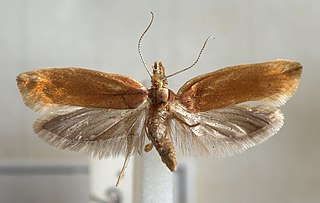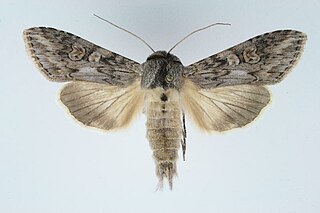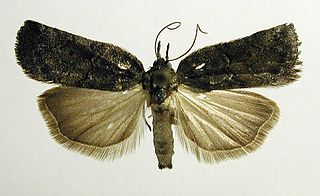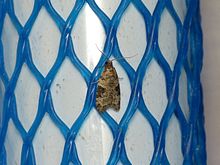
The double-striped pug is a moth of the family Geometridae. It is a widespread and common species, being found throughout the Palearctic region, including the Near East and North Africa.

The purple hairstreak is a butterfly in the family Lycaenidae distributed throughout much of Europe, North Africa, Anatolia, Caucasia, and Transcaucasia. The larva feeds on Quercus robur, Quercus petraea, Quercus cerris and Quercus ilex.

The mouse moth is a moth of the family Noctuidae. It is a widespread species with a Holarctic distribution.

Apamea crenata, known as the clouded-bordered brindle, is a moth in the family Noctuidae. It is distributed throughout the Palearctic realm. In the North it crosses the Arctic Circle, in the Mediterranean it is found only in cool locations and mountains avoiding very hot areas. In the Alps, it rises to an altitude of about 2000 metres.

The Broom Moth(Ceramica pisi) is a moth of the family Noctuidae. It is found in all of Europe, East across the Palearctic to Siberia and the Russian Far East. In the north, it is found far beyond the Arctic Circle and in the south to northern Spain. In the Alps, it is found at heights of up to 2,000 metres.

The pale-lemon sallow is a moth of the family Noctuidae. It is found from Europe to Anatolia and Morocco.

Ypsolopha ustella, the variable ypsolopha moth, is a moth of the family Ypsolophidae. It is found in most of Europe and is also present in North America.

Lygephila craccae, the scarce blackneck, is a moth of the family Erebidae. It is found in temperate Europe and across the Palearctic to the Altai Mountains, Korea, Japan and China.

Apamea zeta is a moth of the family Noctuidae. It has a Holarctic distribution, and can be found throughout the Northern Hemisphere. It occurs throughout Europe and the northern half of North America.

Anopina is a genus of moths belonging to the subfamily Tortricinae of the family Tortricidae.

Cucullia artemisiae, or scarce wormwood, is a moth of the family Noctuidae. The species was first described by Johann Siegfried Hufnagel in 1766. It is found from central and southern Europe to Turkey and across the Palearctic to western Siberia, Central Asia, Manchuria, the Korean Peninsula and Japan.

Nycteola revayana, the oak nycteoline, is a moth of the family Nolidae. The species was first described by Giovanni Antonio Scopoli in 1772. It is found from Europe and east across the Palearctic to Japan and India.

Epirrhoe galiata, the galium carpet, is a moth of the family Geometridae.

Eupithecia trisignaria, the triple-spotted pug, is a moth of the family Geometridae. It is found from across the Palearctic realm from Europe to Siberia.

Callopistria latreillei, Latreille's Latin, is a moth of the family Noctuidae. The species can be found in the Palearctic realm, most parts of Europe, Asia, and in Africa from Egypt to South Africa. The habitat consists of rocky limestone slopes with deciduous woodland.
Anopina arizonana is a moth of the family Tortricidae first described by Lord Walsingham in 1884. It is found in North America from southern interior British Columbia and from Waterton Lakes, Alberta, south to Arizona.
Anopina xicotepeca is a species of moth of the family Tortricidae. It is found in Puebla, Mexico.
Oregocerata triangulana is a species of moth of the family Tortricidae. It is found in Colombia.
Acleris busckana is a species of moth of the family Tortricidae. It is found in North America, where it has been recorded from Maine, Manitoba, Massachusetts, New Brunswick, New Hampshire, Ohio, Ontario, Quebec and West Virginia.

Eucosma dorsisignatana, the triangle-backed eucosma, is a species of moth of the family Tortricidae. It is found in North America, where it has been recorded from Nova Scotia to Florida, west to Texas and north to Manitoba.
















